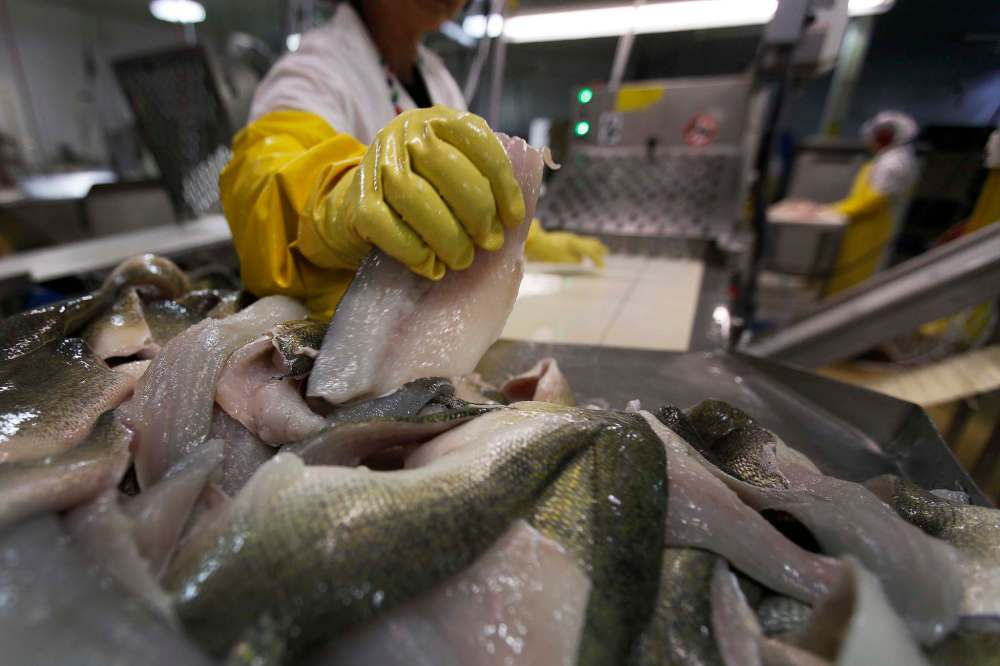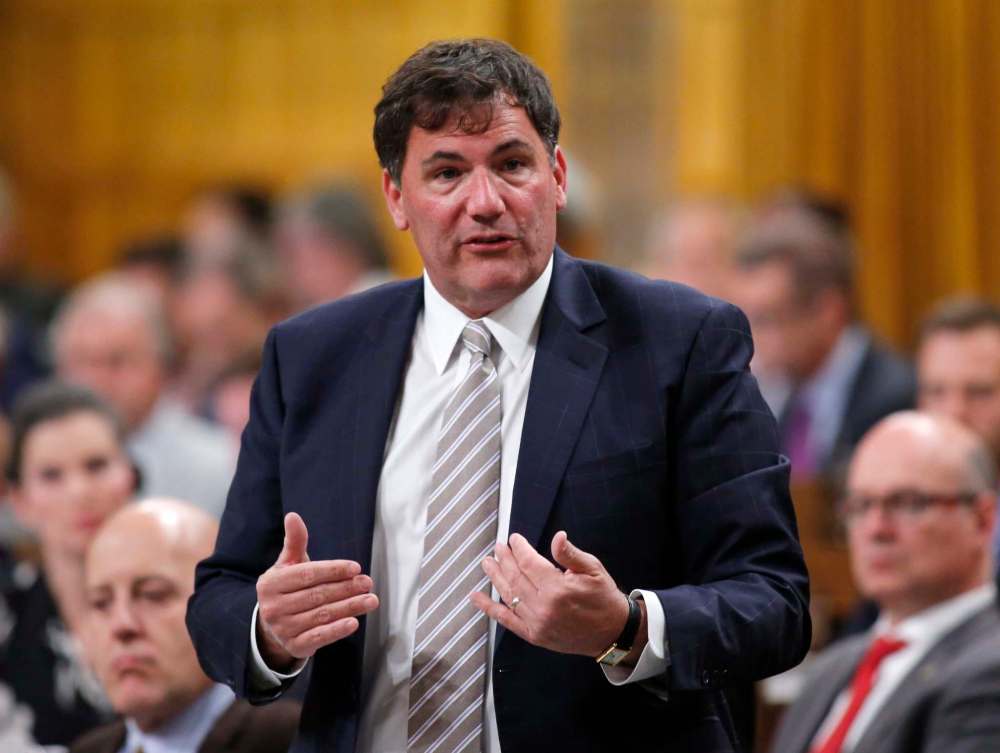Frequent processing plant injuries just one of many problems with Freshwater Fish Marketing Corp.: critics
Advertisement
Read this article for free:
or
Already have an account? Log in here »
To continue reading, please subscribe:
Monthly Digital Subscription
$1 per week for 24 weeks*
- Enjoy unlimited reading on winnipegfreepress.com
- Read the E-Edition, our digital replica newspaper
- Access News Break, our award-winning app
- Play interactive puzzles
*Billed as $4 plus GST every four weeks. Offer only available to new and qualified returning subscribers. Cancel any time.
Read unlimited articles for free today:
or
Already have an account? Log in here »
Hey there, time traveller!
This article was published 14/06/2018 (2455 days ago), so information in it may no longer be current.
OTTAWA — Injuries reported at the troubled Freshwater Fish Marketing Corp.’s processing plant in Winnipeg are at least three times more frequent than industry norms, according to documents filed in Parliament.
Corporate plans obtained by the Free Press suggest FFMC is also struggling to reform itself with just three of its required seven members on its board of directors.
“This is a clear case of neglect from the federal government,” Manitoba Conservative MP Robert Sopuck said.

The FFMC has been cited as arguably one of Canada’s most dysfunctional Crown corporations, after multiple, scathing audits have found pervasive mismanagement dating to at least 2005, dodgy hiring practices and insufficient health-and-safety training.
Last November, some Liberal MPs began to explore the possibility of closing the Transcona-based plant, which employs 250 full-time and 150 seasonal workers.
FFMC’s 2015-16 corporate plan revealed it had recorded 14.7 accidents per 100 employees in the previous year, a rate much higher than fish-processing plants elsewhere in Canada. The agency stopped disclosing its injury rate in subsequent corporate reports.
The Free Press contacted workers compensation boards in five coastal provinces; injury rates were between 66 per cent and 86 per cent lower than those reported by FFMC.
FFMC has been trying to get its WCB claims under control. During the 2016-17 fiscal year, FFMC forecast it would pay out $308,000, a number it was aiming to reduce to $205,000, but instead saw rise to $397,000.
FFMC refused interview requests, citing June as one of its busiest months. Fisheries and Oceans Canada said only the Crown corporation could speak to injury rates.
Sopuck said he wasn’t sure about the reason for the number of WCB claims, suggesting it could be fuelled by morale issues arising from pervasive mismanagement or possible safety-training issues.
“I’ve toured that plant and there’s a lot of sharp equipment,” said the Dauphin-Swan River-Neepawa MP, a former marine biologist.
NDP MP Daniel Blaikie, whose Elmwood-Transcona riding includes the plant, says he’s hoping to hear from workers and unions if people are feeling unsafe.
“If a particular plant has above-average rates of injury, then that’s something someone should be looking into and developing a solution for,” he said.
Ottawa established the FFMC in 1969 to help mostly Indigenous fishermen in Western and northern Canada sell their catches from isolated communities to domestic and international clients. The agency buys, processes and sells almost $75-million worth of fish each year.
Starting in late 2014, the federal government installed new leadership to clear up FFMC’s management issues. But the corporation wrote in its most recent corporate plan it has only three of eight board positions filled, and chief executive officer Stan Lazar has “formally requested that the government of Canada urgently fill these positions.”
For Blaikie, the board shortage and “an extraordinary number of workplace injuries” go hand-in-hand. “They’re causing backlogs and they’re causing, in this case, governance issues, because they’re just not getting people in place to do the job that needs doing,” he said.
Fisheries Minister Dominic Leblanc’s office declined an interview, saying its board-appointment process was nearing its conclusion.
But Blaikie says the Liberals’ slow approach to appointments is impacting multiple agencies and even courts, without any clear explanation.
A separate audit tabled last month found Ottawa had neglected the Canadian Museum for Human Rights during a time when financial pressures threatened to scale back the Winnipeg museum’s exhibits. The report noted a board shortage and surface-level reviews of the museum’s corporate plans. (Ottawa has since appointed more board members and boosted its funding.)

“The government gets asked about that a lot and they say, ‘Well, it’s coming soon,’ but eventually these things need to happen,” Blaikie said. “If you’re not filling those positions, then that work isn’t going to get done and it’s a failure of government, to govern, to leave those positions vacant.”
The short-staffed board means there is no chair for FFMC’s audit and risk committee, meant to navigate threats to the agency.
FFMC tabled four annual corporate plans to Parliament this month; it’s unclear why the agency hadn’t provided these during their actual timeframes.
The corporate plan for 2014-15 said a decade ago, “the Winnipeg processing facility was at high risk of closure due to equipment failure or loss of federal registration because of non-compliance,” though it said it had since upgraded its equipment.
“At this point, the risk of plant closure or non-compliance with food safety regulations has been reduced to acceptable levels.”
Donald Salkeld led the agency for 14 months until March 2016, when Ottawa said he was “terminated for cause.” He recalls the plant’s ongoing upgrades were long overdue: “I was quite astonished at some of the conditions that people were working (in) down there.”
He said the injury rate may be a result of the culture at a Crown corporation that has had issues for so long.
“They get pretty complacent, and complacency leads to problems. And when you’re not accountable, it leads to more problems,” Salkeld said. “It’s just part of the beast.”
Regardless, corporate plans suggest FFMC is making strides to pay off its debt and shore up more cash for future risks, such as economic sanctions, the decline of pickerel in Lake Winnipeg and the privatization of fisheries.
In December, Manitoba ended its monopoly agreement with FFMC, which put four-fifths of the agency’s business into the private market, though the agency was able to voluntarily enlist fishers who accounted for 80 per cent of that business. Others have reported losing roughly $1 million in the first month of business.
Meanwhile, the most recent corporate plan shows FFMC setting a target of just $4.4 million in profit before final payments and income taxes, despite earning $7.6 million the previous year. The report doesn’t explain why FFMC expects less than a third of the previous year’s profits, and neither would the agency.
dylan.robertson@freepress.mb.ca

